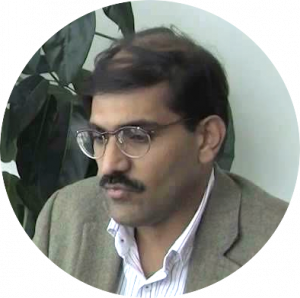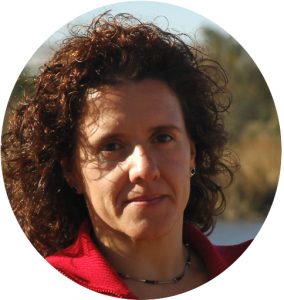
 |
Ciro Cattuto is the Scientific Director of ISI Foundation in Turin, Italy. His main interests are in Computational Social Science, Data Science, Web Science, Infectious Disease Dynamics and Digital Epidemiology. More specifically, he is interested in the convergence of the digital and the physical driven by the adoption of personal networked devices, wearable sensors and the ensuing multiplication of behavioral proxies. He works with data on digitally-sensed/mediated human behaviors, targeting research questions in computational social science and digital epidemiology. For this, he makes use of concepts and models from complex systems science and network science together with methods from data mining and machine learning. |
 |
Tina Eliassi-Rad is an Associate Professor of Computer Science at Northeastern University in Boston, MA. She is also on the faculty of Northeastern’s Network Science Institute. Prior to joining Northeastern, Tina was an Associate Professor of Computer Science at Rutgers University; and before that she was a Member of Technical Staff and Principal Investigator at Lawrence Livermore National Laboratory. Tina earned her Ph.D. in Computer Sciences (with a minor in Mathematical Statistics) at the University of Wisconsin-Madison. Her research is rooted in data mining and machine learning; and spans theory, algorithms, and applications of massive data from networked representations of physical and social phenomena. Tina’s work has been applied to personalized search on the World-Wide Web, statistical indices of large-scale scientific simulation data, fraud detection, mobile ad targeting, and cyber situational awareness. Her algorithms have been incorporated into systems used by the government and industry (e.g., IBM System G Graph Analytics) as well as open-source software (e.g., Stanford Network Analysis Project). In 2010, she received an Outstanding Mentor Award from the Office of Science at the US Department of Energy. |
 |
James Gleeson has held a Chair in Industrial and Applied Mathematics at the University of Limerick since 2007. James’ research interests are in mathematical modeling of stochastic dynamics, with a particular focus on Complex Systems and Networks. He is a SEES co-PI, has held three Principal Investigator awards from Science Foundation Ireland, and is a co-PI on a Future and Emerging Technologies project funded by the European Commission’s FP7. James is co-director of MACSI, the Mathematics Applications Consortium for Science and Industry. MACSI researchers develop and apply mathematical techniques to assist collaborators from science and industry in solving real-world problems. |
 |
Sanjeev Goyal is Fellow of the British Academy and Founding Director of the Cambridge-INET Institute. Sanjeev Goyal’s conducts his research on the economics of Networks and Economic Theory, and is one of the leading academics in his field. He is currently co-principle investigator on an ERA-Net on Complexity and EPSRC funded study on the ‘Resilience and Interaction of Networks in Ecology and Economics. Goyal has made pioneering contributions to our understanding of social and economic networks, with publications in leading international journals. In 2007, Princeton University Press published his book “Connections: An introduction to the economics of networks”. In Connections, Sanjeev Goyal puts contemporary thinking about networks and economic activity into context. Written in a style that combines simple examples with formal models and complete mathematical proofs, Connections is a concise and self-contained treatment of the economic theory of networks. |
 |
Susanna Manrubia is a full researcher at the National Centre for Biotechnology (CSIC), Madrid, where she leads the Evolutionary Systems Group within the Systems Biology Programme. Her activity is mainly focus on developing theoretical and computational descriptions of biological phenomena, from the genome to large-scale evolution. She is also interested in cultural patterns and collective social behavior. Susanna graduated in Physics at the Universitat de Barcelona and afterwards, she moved first to Berlin at the Fritz-Haber-Institut of the Max Planck Society and then to the Max Planck Institute of Colloids and Interfaces. From 2001 to 2014, she coordinated the program on Molecular Evolution at the Centro de Astrobiología and led a group working on Evolutionary Systems. On 2014, she also joined the Systems Biology Program of the Spanish National Biotechnology Centre (CSIC). Susanna serves as Section Editor for BMC Evolutionary Biology and she is a founding member of the Editorial Board of Virus Evolution, launched in Spring 2015. Susanna belongs also to complejiMad, a society responsible for promoting knowledge and transfer of the sciences of complexity. |
 |
Arne Traulsen is the Director of Max Planck Institute for Evolutionary Biology, Plön, Germany and Honorary Professor at Lübeck University since 2012. He is working on evolutionary game theory, an extension of classical game theory to biology. In the past years, evolutionary game theory has attracted increasing interest of economists, sociologists, and also physicists. Arne Traulsen applies techniques from statistical physics to these systems and has been a major figure in developing the field of stochastic evolutionary game dynamics. One of the most intriguing problems of evolutionary game theory is the evolution of cooperation: How can cooperation between selfish actors emerge when every individual is not interested in the welfare of the group, but maximizes his or her personal payoff? The evolutionary theory group that he conducts uses mathematics and computer simulations to study the dynamics of evolution and different regimes of mutation, selection, population size and population structure to infer how they influence the evolutionary dynamics. |
 |
Alessandro Vespignani is Sternberg Distinguished Professor at Northeastern University, US, and Director of the Network Science Institute. Vespignani has worked in a number of areas of non-equilibrium particle systems, statistical physics and computational sciences, including characterization of non-equilibrium phase transitions, fractal growth and self-organized criticality. Recently Vespignani’s research activity focuses on the interdisciplinary application of statistical and numerical simulation methods in the analysis of epidemic and spreading phenomena and the study of biological, social and technological networks. For several years he has been working on the characterization and modeling of the Internet, the WWW and large-scale information networks. He is now focusing his research activity in modeling the spatial spread of epidemics, including the realistic and data-driven computational modeling of emerging infectious diseases, the resilience of complex networks and the behavior of techno-social systems. He is author of the book: Evolution and Structure of the Internet and the monograph Dynamical Processes on Complex Networks. |
